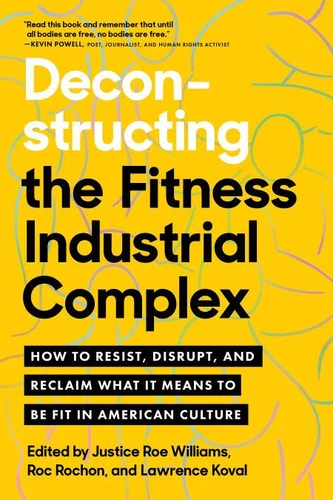Deconstructing the Fitness-Industrial Complex. How to Resist, Disrupt, and Reclaim What It Means to Be Fit in American Culture
Par : , ,Formats :
Disponible dans votre compte client Decitre ou Furet du Nord dès validation de votre commande. Le format ePub protégé est :
- Compatible avec une lecture sur My Vivlio (smartphone, tablette, ordinateur)
- Compatible avec une lecture sur liseuses Vivlio
- Pour les liseuses autres que Vivlio, vous devez utiliser le logiciel Adobe Digital Edition. Non compatible avec la lecture sur les liseuses Kindle, Remarkable et Sony
- Non compatible avec un achat hors France métropolitaine
 , qui est-ce ?
, qui est-ce ?Notre partenaire de plateforme de lecture numérique où vous retrouverez l'ensemble de vos ebooks gratuitement
Pour en savoir plus sur nos ebooks, consultez notre aide en ligne ici
- Nombre de pages240
- FormatePub
- ISBN978-1-62317-728-7
- EAN9781623177287
- Date de parution02/05/2023
- Protection num.Adobe DRM
- Taille1 Mo
- Infos supplémentairesepub
- ÉditeurNorth Atlantic Books
Résumé
Perspectives from QTBIPOC, fat, and disabled trainers, bodyworkers, and coaches on reimagining fitness for all bodies. For readers of Belly of the Beast, Care Work, and The Body is Not an ApologyFit is subjective. Who our society designates as fit--and who gets to be fit in our society--is predefined by the coaches, gyms, and systems at large that uphold and reproduce the Fitness Industrial Complex for their own structural and material gain.
The Fitness Industrial Complex uplifts some bodies while denigrating others. Bodies that are Black, Brown, queer, trans, poor, fat, and disabled--bodies that don't conform, that resist and disrupt--are excluded from being "fit." Through the stories and experiences of activist trainers, coaches, and bodyworkers of diverse identities and experiences, this anthology interrogates: The ideas and beliefs we've internalized about health, fitness, and our own and others' bodies How to deconstruct and re-envision fitness as a practice for all bodies The fitness industry's role in upholding and reinforcing oppression Exclusivity, unsafety, and harm in mainstream fitness spaces How to empower ourselves and our communities to push back against the FIC Speaking directly to sick, queer, trans, disabled, and BIPOC readers, Deconstructing the Fitness Industrial Complex is part urgent inquiry, part radical deconstruction, and part call to action: to build spaces that welcome and work for all; to reclaim movement as a vital and liberatory practice; and to embody a model of joy and community care outside the mainstream fitness culture.
The Fitness Industrial Complex uplifts some bodies while denigrating others. Bodies that are Black, Brown, queer, trans, poor, fat, and disabled--bodies that don't conform, that resist and disrupt--are excluded from being "fit." Through the stories and experiences of activist trainers, coaches, and bodyworkers of diverse identities and experiences, this anthology interrogates: The ideas and beliefs we've internalized about health, fitness, and our own and others' bodies How to deconstruct and re-envision fitness as a practice for all bodies The fitness industry's role in upholding and reinforcing oppression Exclusivity, unsafety, and harm in mainstream fitness spaces How to empower ourselves and our communities to push back against the FIC Speaking directly to sick, queer, trans, disabled, and BIPOC readers, Deconstructing the Fitness Industrial Complex is part urgent inquiry, part radical deconstruction, and part call to action: to build spaces that welcome and work for all; to reclaim movement as a vital and liberatory practice; and to embody a model of joy and community care outside the mainstream fitness culture.
Perspectives from QTBIPOC, fat, and disabled trainers, bodyworkers, and coaches on reimagining fitness for all bodies. For readers of Belly of the Beast, Care Work, and The Body is Not an ApologyFit is subjective. Who our society designates as fit--and who gets to be fit in our society--is predefined by the coaches, gyms, and systems at large that uphold and reproduce the Fitness Industrial Complex for their own structural and material gain.
The Fitness Industrial Complex uplifts some bodies while denigrating others. Bodies that are Black, Brown, queer, trans, poor, fat, and disabled--bodies that don't conform, that resist and disrupt--are excluded from being "fit." Through the stories and experiences of activist trainers, coaches, and bodyworkers of diverse identities and experiences, this anthology interrogates: The ideas and beliefs we've internalized about health, fitness, and our own and others' bodies How to deconstruct and re-envision fitness as a practice for all bodies The fitness industry's role in upholding and reinforcing oppression Exclusivity, unsafety, and harm in mainstream fitness spaces How to empower ourselves and our communities to push back against the FIC Speaking directly to sick, queer, trans, disabled, and BIPOC readers, Deconstructing the Fitness Industrial Complex is part urgent inquiry, part radical deconstruction, and part call to action: to build spaces that welcome and work for all; to reclaim movement as a vital and liberatory practice; and to embody a model of joy and community care outside the mainstream fitness culture.
The Fitness Industrial Complex uplifts some bodies while denigrating others. Bodies that are Black, Brown, queer, trans, poor, fat, and disabled--bodies that don't conform, that resist and disrupt--are excluded from being "fit." Through the stories and experiences of activist trainers, coaches, and bodyworkers of diverse identities and experiences, this anthology interrogates: The ideas and beliefs we've internalized about health, fitness, and our own and others' bodies How to deconstruct and re-envision fitness as a practice for all bodies The fitness industry's role in upholding and reinforcing oppression Exclusivity, unsafety, and harm in mainstream fitness spaces How to empower ourselves and our communities to push back against the FIC Speaking directly to sick, queer, trans, disabled, and BIPOC readers, Deconstructing the Fitness Industrial Complex is part urgent inquiry, part radical deconstruction, and part call to action: to build spaces that welcome and work for all; to reclaim movement as a vital and liberatory practice; and to embody a model of joy and community care outside the mainstream fitness culture.



